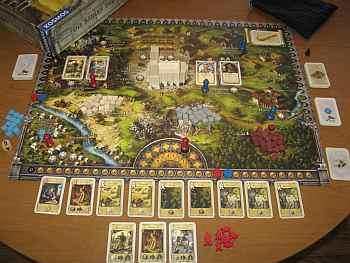A Game Can Be Fun for a Long Time
I wrote earlier that there is no such thing as a bad board game, only games that you might not like. I also contend that you can’t know how much you like a game until you’ve played it at least once, and some games need at least a second chance before you can really say you don’t want to play them anymore.
The Number of Winning Strategies Is Significant
Games can have from zero to (probably) an infinite number of winning strategies.

Candyland has no real winning strategies to choose from, unless you count “continue to pick cards instead of quitting”. Even that can’t be called a winning strategy because it doesn’t guarantee a win every time.
There are probably a fair number of games (maybe mostly children’s games) with just a few winning strategies, but I don’t want to discuss them here today. Right now I’m interested in board games with multiple; that is, many possible winning strategies.
How long will those games be fun for you? Have you ever thought about that? Are you satisfied with trying just a few different strategies and then consider the game to be worn out? Do you need try try most of the strategies at least once before giving up on the game? Do you think you’ve got them all mastered and only then will you stop playing the game? Are you sure you’ve tried them all? What about defensive strategies? Have you tried any cooperative strategies in multi-player (i.e. more than 2 players) games?
Which games will you continue to play even after you’ve worn out all the options? Why are those games still fun to play? I have one game in particular called The Pillars of the Earth that I have played so many times (60, as of this writing) that it feels…well, not worn out, but more like broken-in, like a really comfortable pair of shoes. I’m not sure there’s much more to discover, but it’s still a wonderful game to come back to every so often. And I like teaching it to new players too.
A Strong Theme Adds to the Enjoyment
Every game (except those that are totally abstract) has some sort of theme. There’s farming, war, home improvement, bartering at the bazaar, city building, canal digging, mystery solving, real estate, archaeology, conquest, racing, exploration, fantasy, mythology, garbage collection, outer space, zombies, and so much more.
Are there themes that so repulse you that you won’t even play the game once? Maybe there’s too much blood and guts or unusual graphics. Have you ever tried to get past the theme just to play the game because the mechanics, strategy, and tactics were inviting?
I’ve played Reiner Knizia’s Relationship Tightrope just a few times. The title explains the theme which is depicted on the cards, but it has nothing to do with the game itself, which is really an abstract about balancing the number of colored (pink and blue…yeah) sticks you end up with.
It’s a short game that’s sometimes considered a filler to be played around longer games. I tend not to play fillers much in the first place, so along with the theme, that’s probably why I’ve only played this one twice. But that doesn’t make it a bad game. It’s just not one that I (and those I usually play games with) care for as much as the others I own.
Have you ever re-themed a game to make it more palatable?
Rules Can Be Simple But Not Too Complex
Rules can be short and sweet or long and complex. They also run the gamut of everything in between. How complicated do rule sets have to get before you’ll hesitate to learn and play a game? I’ve passed on some (the German game Die Macher and most war games) that sounded really hard to learn. That was before I had played a large variety of games, so maybe tolerance for complexity is a function of gaming experience. It also can be related to how many hours you have available for the teaching phase and then that first game.
Games I’ve decided against playing years ago I would very likely be willing to try today, having played games like Agricola, Caylus, Tikal, Le Havre, Tigris & Euphrates, Race for the Galaxy, and others in the meantime. Not that these are the most complex games in the market, but they have prepared me for others that are equally and more complicated.
Some people say they don’t like to think too much (after a hard day at work or whatever) when playing a game. I think that the thinking you do when playing a game is different enough from what goes on between 9 and 5 Monday through Friday that you won’t consider it a chore. If I may state the obvious: Games are for playing, and playing is for fun. So take some time to play one of these fun board games with friends or family today.
